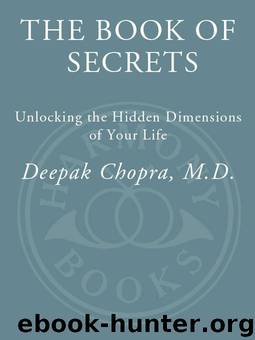The Book of Secrets by M.D. Deepak Chopra

Author:M.D. Deepak Chopra [Deepak Chopra, M.D.]
Language: eng
Format: epub, mobi
Tags: Fiction
ISBN: 1400083141
Publisher: Harmony Books
Published: 2004-08-16T23:00:00+00:00
Situation: A normal situation is infused with something unusual or slightly stressful.
Bodily response: We experience a physical reaction that is associated with the stress.
Interpretation: These physical signals are labeled as signs of danger, and unconsciously the mind jumps to the conclusion that the danger has to be real (the unconscious mind is very concrete, which is why nightmares seem as threatening as actual events).
Decision: The person chooses to think “I am afraid right now.”
Because these ingredients fuse so quickly, they seem to be a single response, when in fact there is a chain of tiny events. Every link of the chain involves a choice. The reason we can’t let raw sensation go without interpreting it is that for reasons of survival the human mind was built to find meaning everywhere. Phobias can be treated by slowly taking the phobic person back through the formative chain of events, allowing him or her to make new interpretations. By slowing the response down and giving the person time to look at it, the knot of fear can be undone. Gradually, the noises associated with flying return to their neutral, nonthreatening place.
The fleeting gap between sensation and interpretation is the birthplace of the shadow. When you go into the gap and see how intangible everything is, the ghosts begin to disperse.
Because terrorism now weighs so heavily on people’s minds, the issue of mass evil cannot be avoided. The two most troubling questions are “How did ordinary people agree to participate in such evil?” and “How could innocent people become the victims of atrocities?”
The Stanford Prison Experiment and our discussion of the shadow come close to answering these questions, but I can’t give one answer to satisfy all comers—any time evil is brought up, we find ourselves visited by our own shadow. What could I have done about Auschwitz? a voice inside us says, usually in guilty, accusing tones. No answer will ever reverse the past, but it’s important to realize that no answer should be expected to.
The best approach to mass evil is not to keep remembering it but to renounce it so completely in yourself that the past is purified through you. My best answer to “How did ordinary people agree to participate in such evil?” lies in the pages you’ve just read. Evil is born in the gap. The gap isn’t anyone’s private possession. The gap contains collective responses and collective themes. When an entire society accepts the theme of “the outsiders” who cause all the trouble, then evil has everyone for a father and mother.
Yet in every case of mass evil, there were thousands of people who didn’t identify with the collective impulse—they resisted, escaped, hid, and tried to save others. It’s individual choice that determines whether you latch on to the collective theme and agree to play it out.
The second question, “How could innocent people become the victims of atrocities?” is more difficult, because almost everyone’s mind is already closed. The questioner doesn’t want a new answer. There is too
Download
This site does not store any files on its server. We only index and link to content provided by other sites. Please contact the content providers to delete copyright contents if any and email us, we'll remove relevant links or contents immediately.
| Acupuncture & Acupressure | Aromatherapy |
| Ayurveda | Chelation |
| Chinese Medicine | Energy Healing |
| Healing | Herbal Remedies |
| Holistic | Homeopathy |
| Hypnotherapy | Massage |
| Meditation | Naturopathy |
| Reference |
Inner Engineering: A Yogi's Guide to Joy by Sadhguru(6796)
The Power of Now: A Guide to Spiritual Enlightenment by Eckhart Tolle(5784)
Fear by Osho(4740)
Ikigai by Héctor García & Francesc Miralles(4275)
The Art of Happiness by The Dalai Lama(4130)
The Ultimate Bodybuilding Cookbook by Kendall Lou Schmidt(3945)
Yoga Therapy by Mark Stephens(3749)
The Little Book of Hygge by Meik Wiking(3694)
The Healing Self by Deepak Chopra(3583)
Why Buddhism is True by Robert Wright(3454)
The Hatha Yoga Pradipika (Translated) by Svatmarama(3343)
Being Aware of Being Aware by Rupert Spira(3277)
Shift into Freedom by Loch Kelly(3199)
Wild Words from Wild Women by Stephens Autumn(3153)
Work Clean by Dan Charnas(3123)
Happiness by Matthieu Ricard(3050)
More Language of Letting Go: 366 New Daily Meditations by Melody Beattie(3030)
Yoga Body & Mind Handbook by Jasmine Tarkeshi(2880)
Why I Am Not a Feminist by Jessa Crispin(2760)
